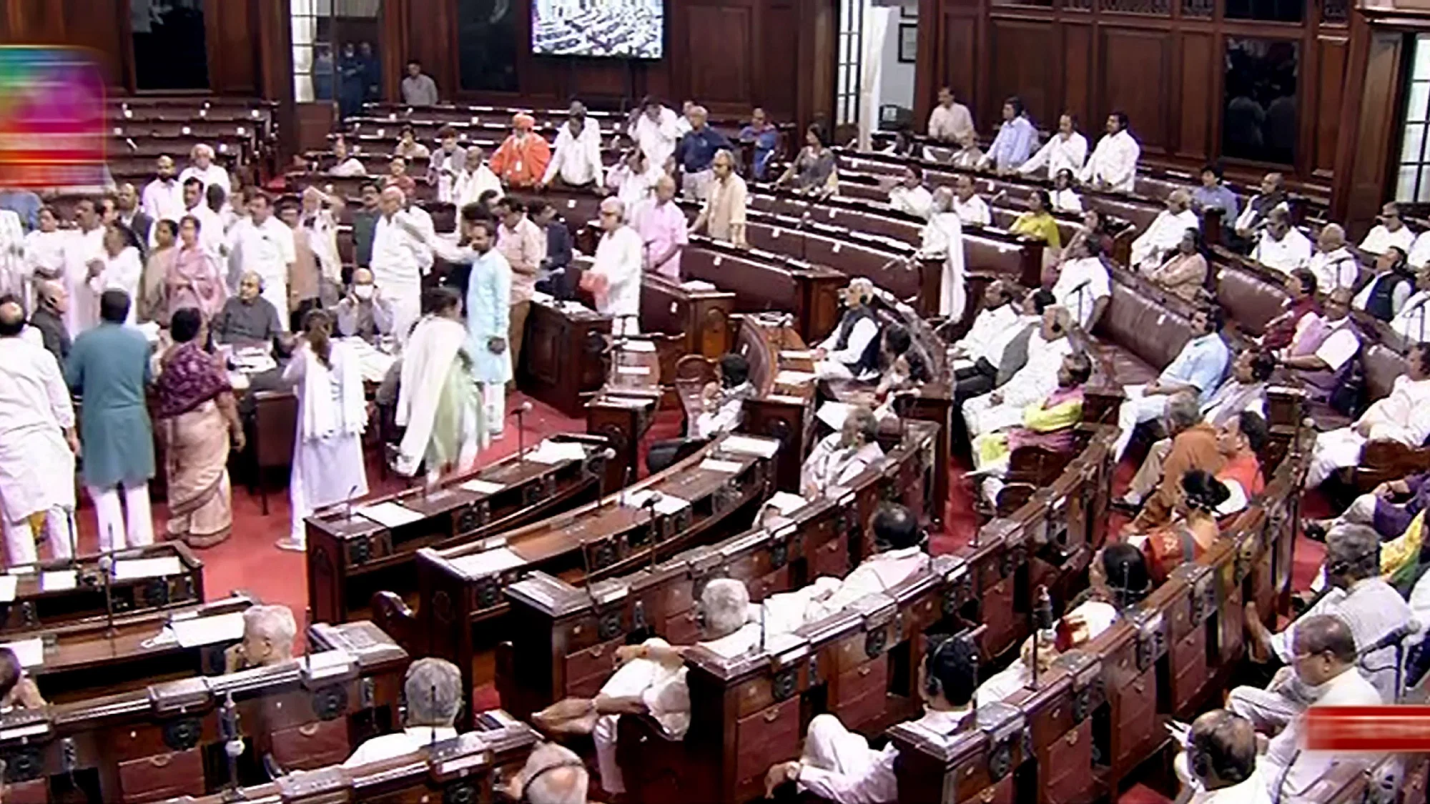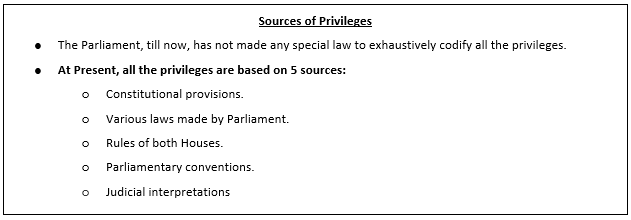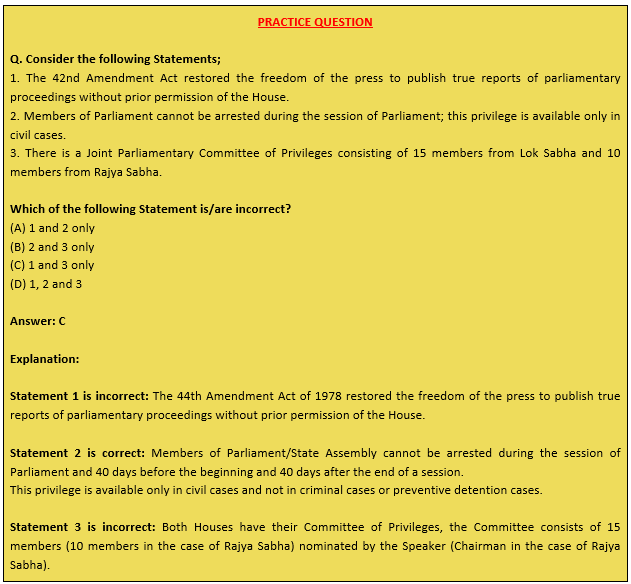Description

Copyright infringement not intended
Context
- The Chairman of the Rajya Sabha has asked a parliamentary committee to investigate the allegations of privilege breach against 12 MPs for repeatedly entering the well of the House, shouting slogans and obstructing the house proceedings.
Details
- Some Members of the Rajya Sabha made complaints to the chairman that frequent disruptions by some members were a breach of their privilege.
- A Member can't directly make complaints to Privilege Committee, therefore the matter came to the Chairman, who as per rule referred it to Privilege Committee to examine, investigate and report.
.jpeg)
Parliamentary Privileges
- Article 105 and Article 194 of the Indian Constitution mentioned certain privileges for the Member of Parliament and State Assembly respectively so that they can perform their duties without any obstruction.
- They are the special rights, immunities and exemptions enjoyed by the Members of Parliament/State Assembly, its committees and their members.
- These privileges do not extend to the president who is also an integral part of the Parliament.
- These privileges are necessary to secure their independence in working.
- Without these privileges;
- The Houses cannot maintain their authority, dignity and honour.
- The House cannot protect its members from any obstacle in the discharge of their parliamentary responsibilities.
- The Indian Constitution has also extended these privileges to the persons who are authorised to speak and take part in the Parliamentary procedures or any of its committees.
- These include the attorney general of India and Union ministers.
- These Privileges can be classified into two broad categories:
- Collective Privileges - Those that are collectively enjoyed by the each House of Parliament.
- Individual Privileges - Those that are individually enjoyed by the members.

Collective Privileges
- Parliament/State Assembly has the right to publish its reports, debates and proceedings and also the right to prohibit others from publishing the same.
- The 44th Amendment Act of 1978 restored the freedom of the press to publish true reports of parliamentary proceedings without prior permission of the House.
- But this is not applicable in the case of a secret sitting of the House.
- It can exclude strangers from its proceedings and hold secret sittings to discuss some important matters.
- It can make rules to regulate its procedure and the conduct of its business.
- It can punish members as well as outsiders for breach of its privileges.
- It has the right to receive immediate information about the arrest, detention, conviction, imprisonment and release of a member.
- The courts are prohibited to inquire into the proceedings of a House or its committees.
- No person (either a member or outsider) can be arrested, and no legal process (civil or criminal) can be served within the House without the permission of the presiding officer.
Individual Privileges
- Members of Parliament/State Assembly cannot be arrested during the session of Parliament and 40 days before the beginning and 40 days after the end of a session.
- This privilege is available only in civil cases and not in criminal cases or preventive detention cases.
- They have freedom of speech in Parliament. No member is liable to any proceedings in any court for anything said or any vote given by him in Parliament or its committees.
- They are exempted from jury service. They can refuse to give evidence and appear as a witness in a case pending in a court when Parliament is in session.
Committee of Privileges
- Each House of Parliament and its Committees collectively and members of each House individually enjoy certain rights, privileges and immunities without which they cannot perform their functions efficiently and effectively.
- The object of parliamentary privilege is to safeguard the freedom, authority and dignity of Parliament.
- The Committee consists of 15 members (10 members in the case of Rajya Sabha) nominated by the Speaker (Chairman in the case of Rajya Sabha).
- In the Lok Sabha, the Speaker nominates the head of the committee of privileges.
- In the Rajya Sabha, the deputy chairperson heads the committee of privileges.
- Its function is to examine every question involving a breach of privilege of the House or the members of any Committee.
- It determines concerning the facts and makes suitable recommendations in its report.

Privilege Motion
- All Members of Parliament (MPs) enjoy rights and immunities, individually and collectively, so that they can discharge their duties and functions effectively.
- Any instance when these rights and immunities are disregarded by any member of Lok Sabha or Rajya Sabha is an offence, called ‘breach of privilege’, which is punishable under the Laws of Parliament.
- Any member from either house can move a notice in the form of a motion against the member who he/she thinks is guilty of the breach of privilege.
- Both Houses of Parliament reserve the right to punish any act of contempt (not necessarily a breach of privilege) which is against its authority and dignity, as per the laws.
Rules concerning the privilege Motion:
- The rules governing the privilege are mentioned in Rule No 222 in Chapter 20 of the Lok Sabha Rule Book and Rule 187 in Chapter 16 of the Rajya Sabha
- The rules explain that any member of the House may, with the consent of the Speaker or the Chairperson, raise a question involving an incident that he or she considers a breach of privilege either of a member or of the House or a committee.
Role of Speaker and Chairperson:
- The speaker of Lok Sabha and the Chairperson of Rajya Sabha are the first levels of scrutiny of a privilege motion in the two Houses of Parliament.
- They can either decide on the privilege motion or can also refer it to the privileges committee of Parliament.



https://www.livemint.com/news/india/rajya-sabha-chairman-asks-privilege-panel-to-investigate-disorderly-conduct-of-12-opposition-mps-11676910761374.html














